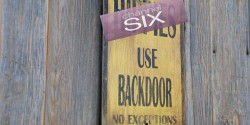There are approximately 18 low-power TV stations posing as radio in the US. They are stations that broadcast on channel 6. And because low-power stations are still permitted to transmit in analog, that means their audio can be received at the very low end of the FM dial, around 87.7 MHz.
For all intents and purposes these stations are scheduled to leave the radio dial on September 1, 2015 when they must convert to digital transmissions. However, the FCC is considering an extension, as proposed in a Third Notice of Proposed Rulemaking.
Surprisingly, the Commission is also considering a proposal to permit these back-door radio stations to continue their services, providing “an analog FM radio-type service as an ancillary or supplementary service consistent with the Communications Act and our rules.” At the same time, the FCC acknowledges that these stations should probably not interfere with non-commercial and educational stations licensed at 87.9 FM and above. The Commission also asks if these stations should be required to apply for a proper FM license, perhaps on a regular FM frequency, or maintain a studio and public inspection file like all other radio stations.
One pertinent issue is the fact that FM stations below 92.1 FM are noncommercial by statute. Yet, many, if not all, of the back-door stations operating on LPTV channel 6 are commercial, such as WGWG-LP in Chicago. The FCC does not specifically address the commercial vs. noncommercial question, although it does ask more broadly,
“which of the Part 73 rules should apply to the offering of an analog FM radio-type service.” Subpart D, part 73.501, specifies exactly the frequencies reserved for noncommercial operation, which do not include 87.7 FM, primarily because this frequency was never officially part of the FM band. It isn’t too hard to argue that the channel 6 analog audio frequency should be noncommercial, by the same principle.
It’s pretty certain that public radio stations will have something to say about this proposal. In a 2009 petition for rule making, NPR urged the FCC to abandon interference protection for channel 6 TV stations, arguing that it is rendered unnecessary after the digital transition. In comments filed in support of this proposal, Chicago Public Radio complained, “Like squatters moving into recently-vacated homes, these LPTV stations are, in effect, intentionally broadcasting commercial radio which spills over onto the reserved portion of the FM band, trespassing on the limited territory of their noncommercial neighbors.”
LPFM stations, in particular, also should take note of this channel 6 proposal because these stations don’t enjoy interference protection from full-powered stations. Now, LPFMs do have to provide interference protection to existing channel 6 LPTV stations, which means new or existing low-power FM stations shouldn’t be under immediate threat from a channel 6 being permitted to remain on the air as-is. But concerns are raised if channel 6s are permitted to alter their operations at all, by increasing power or moving to a proper FM frequency. Such a change could threaten a station that otherwise is well established under current rules.
Aside from the last ditch requests of the channel 6 stations, the ostensible reason for the delay is the forthcoming digital TV incentive auction. During that auction, spectrum allocated to digital TV will be sold off for new wireless services. Some of that spectrum is currently unused, and some of it will be voluntarily given up by television broadcasters in exchange for incentive payments. After the auction it’s expected that the TV bands will be “repacked” to make more efficient use of spectrum.
That auction is now scheduled for mid 2015, which could potentially leave some LPTV operators with little time to figure out their digital transition plans before the September 1 deadline. As the FCC says in its proposal, “at this time it appears that the current LPTV and TV translator digital transition deadline may occur in close conjunction with the incentive auction, leaving LPTV and TV translator stations little or no time to consider its impact before having to complete their digital conversion.”
Like all FCC rule makings, this one is open for public comment (MB Docket 03–185).



